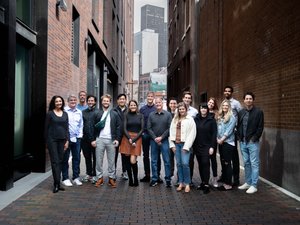
Venture capital activity has plummeted relative to 2021 and 2022.
During the first three quarters of the year, Seattle-area startups secured $2.7 billion across just under 280 deals, according to data from Seattle-based PitchBook Data and the National Venture Capital Association (NVCA). There were 479 deals worth $7.8 billion in the Seattle area last year and 494 deals worth $9.2 billion in 2021.
The drier funding environment has led to layoffs and startups seeking acquisitions, but not all the effects are negative. Local experts note there is a new batch of startup founders who are scrappier and more focused on gaining traction earlier in their journey.
“When getting the cash from investors got harder, founders had to adjust,” said Leslie Feinzaig, founder and CEO of the venture firm Graham & Walker. “The adjustment has to come in the form of either finding a path to getting cash from customers, which necessitates being scrappier in your sales upfront, or meeting the higher traction bar that investors are looking for in this environment. One way or another, in order to get that lifeblood, you just have to move your actual business metrics forward far more than you did two or three years ago.”
Feinzaig added that certain types of companies are still attracting investors in the current environment. Digital health companies are seeing a lot of interest, according to Feinzaig, as consumers’ attitudes toward telehealth changed drastically during the Covid-19 pandemic. Feinzaig also said the recent hype around AI has made startups cognizant of incorporating AI into their pitches.

Whom companies are selling to also makes a difference in their current attractiveness to investors. Kaidi Gao, venture analyst at PitchBook, said investors feel business-to-business software companies are safer because consumer behavior is hard to predict during an economic downturn with high inflation.
Both Gao and Feinzaig noted early-stage startups are getting more attention right now than late-stage companies. These young companies have more time to make an exit, likely after the economy rebounds, and they haven’t yet diluted ownership of the company through previous funding rounds.
Still, PitchBook and NVCA data from their second quarter Venture Monitor report indicates early-stage companies are not immune from the dry market. The report estimated a total of 1,451 angel and seed deals in the U.S. during the second quarter, down 24.7% year over year. Deal value value for angel and seed deals during the quarter was $2.8 billion, down 27.5% from the previous quarter.
“Several factors play into seed-stage lethargy, including startups intentionally delaying raising a next round, investors shifting priorities and rounds taking longer to close across the board,” the report read. “During a market downturn, investors tend to focus on helping existing portfolio companies navigate turbulent waters and reserving capital for making follow-on investments, which leaves them with less time and resources to dive into new opportunities.”
OUT OF NOWHERE
These local companies have launched out of stealth recently with funding.
- Rengage: The Seattle-based marketing startup launched out of stealth in September with $3.2 million in funding. Rengage helps clients market to their existing customers. For example, bank customers might not know that their purchases would get them 5% back if they used a particular credit card, so Rengage could help the bank get the message to customers.
- Gable.ai: The Seattle-based data startup launched out of stealth in September with $7 million in funding. Gable helps developers communicate with data scientists to avoid machine learning breakdowns.
- Roboto AI: The Seattle-based robot data company launched out of stealth in April with $4.8 million in funding. Roboto, founded last year, is a spinout of the Allen Institute for AI. Roboto's software allows clients to collect the huge amounts of data generated by robots, and clients can search these massive data sets as well.
As for what needs to change for the venture market to rebound, Gao said tech company public offerings are crucial. If the tech IPO market is cold, she noted, venture firm partners aren’t getting returns on their earlier investments, which means they can’t pay out the people who invested in the firm to begin with. When those investors have liquidity issues, they don’t invest more into venture firms.
![Kaidi Gao Jan 2023 1[59]](https://media.bizj.us/view/img/12614240/kaidi-gao-jan-2023-159*540xx900-1200-150-0.jpg)
“It’s kind of a vicious cycle,” Gao said. “A frozen IPO market has a trickle-down effect that then permeates across the venture market.”
One major change from the red-hot venture markets of 2021 and early 2022 is that investors now hold more leverage than startups. An abundance of venture capital leaves investors fighting over deals. Now that the supply of funding has dwindled, Gao noted investors are getting better deal terms like more equity and protection for downside scenarios.
“If a company goes out of business and the founder has to sell their (intellectual property) or company collaterals, those are basically ensuring that the investors have priority over people who are holding common stock, which are usually the founders and the employees,” Gao said. “The investors would have priority in terms of getting their money back.”








